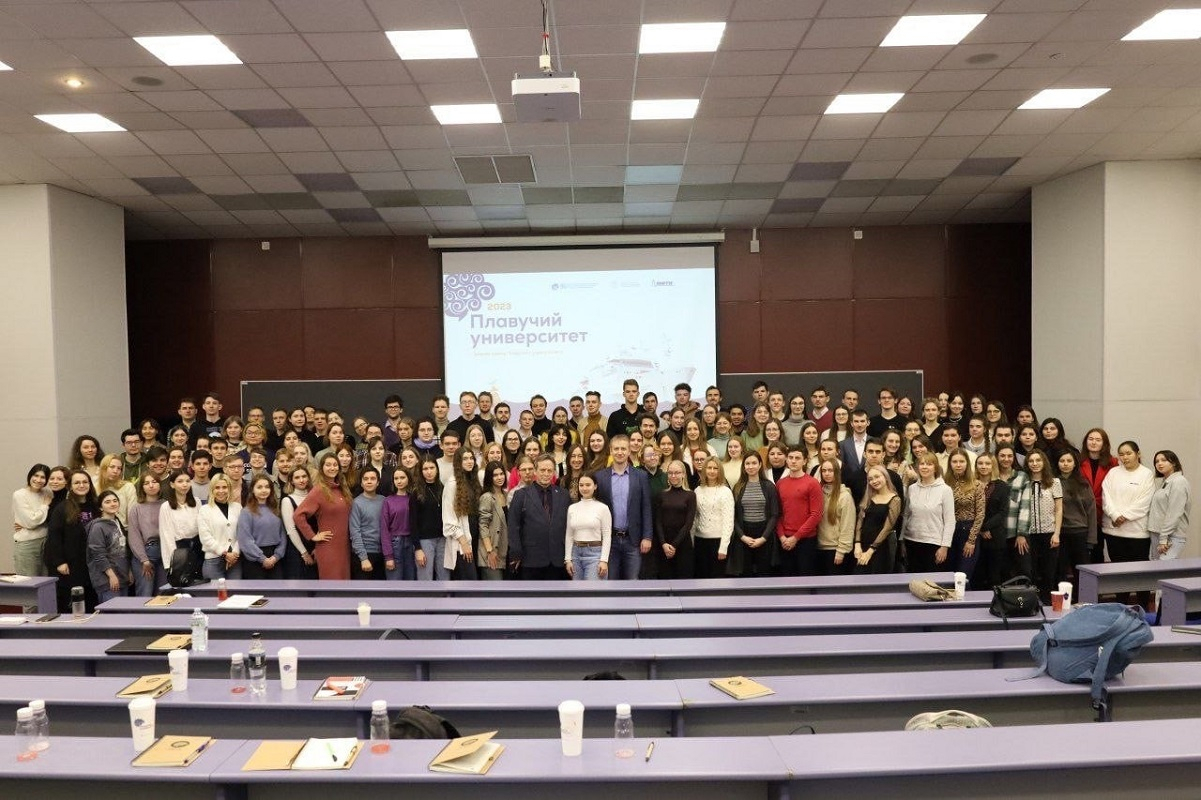Winter School of the Floating University brings students from all across Russia to St Petersburg University

St Petersburg University has hosted the first stage of the annual cycle of the Floating University programme — the Winter School. It was attended by about two hundred undergraduate and postgraduate students from different universities in Russia, who want to pursue a career in marine science and oceanography research.
The event participants were greeted by Professor Kirill Chistyakov, Director of the Institute of Earth Sciences at St Petersburg University, Vice-President of the Russian Geographical Society.
In his address, Professor Chistyakov offered guidance and advice to the participants in the 2023 Winter School of the Floating University. ‘In order to become a sought-after graduate and start a successful career in research, you will have to acquire and master some particular methods of research and data analysis. But never limit yourself to only one area of expertise. Look around at what is happening in related sciences. Any active researcher should change the topic of his or her studies every three to five years.’
Several learning tracks dedicated to key issues in aquatic research and practice were organised on the St Petersburg University campus.
In the learning track "Geological and geophysical surveys of aquatic areas", undergraduate and postgraduate students learned how geological and geophysical surveys of aquatic areas are carried out and acquired theoretical knowledge and practical skills in this study area.
In the learning track "Hydrobiochemical surveys of aquatic areas", the participants could learn a lot of new things about marine phytoplankton, such as why we are all dependent on these microscopic plants. The participants visited a laboratory for polar and marine research and got acquainted with modern open-access ocean colour remote sensing databases. They also learned how to evaluate and visualise the spatial and temporal variability of the main photosynthetic pigment of phytoplankton — chlorophyll a — using Matlab software.
The Winter School is the first stage of the annual cycle of the Floating University programme. It is a competitive selection requirement to participate in sea expeditions. The students of the Floating University study science; collect research data on sea and coastal expeditions; and present their research findings at conferences in Russia and overseas.
The learning track "Satellite data in ocean and sea-ice modelling" featured lectures and a workshop on the processing and visualisation of ocean colour satellite data. Thus, the participants in the Winter School learned about new approaches for monitoring ice conditions using satellite technologies, and about forecasting sea ice conditions using an integrated ocean—ice model.

The initiators and organisers of the 2023 Winter School of the Floating University at St Petersburg University were: Viacheslav Polovkov, Associate Professor in the Department of Geophysics at St Petersburg University, Candidate of Geology and Mineralogy, Head of the master’s programme "Geophysics"; and Polina Lobanova, Associate Professor in the Department of Oceanology at Petersburg University, Candidate of Geography, Head of the master’s programme "Physical Oceanography and Bioproductivity of Ocean and Seas (PHOBOS)".
‘The Floating University programme provides an excellent opportunity to find self-motivated and proactive students from different regions of our country, who want to be engaged in oceanography and marine research. This programme enables us to show current and potential research directions in this field, thereby expanding students’ horizons. Most importantly, the participants are given a real chance to go on a sea expedition aimed to find solutions to the key issues in research and practice, with full-time theoretical and practical training organised on board the research vessel. Upon completion of all the stages of the Floating University programme, the students will upgrade their knowledge and skills and build a professional network of colleagues and potential employers,’ Viacheslav Polovkov emphasised.
St Petersburg University academics prepared for the participants in the Winter School a series of lectures on relevant and interesting topics: "History and causes of urban flooding"; "Microplastics in the ocean"; and others. Additionally, the students were invited to take part in a master class on scientific literature searching, systematisation and analysis. The acquired practical skills will significantly simplify scientific literature searching and improve the quality of literature reviews and graduation projects.
‘I would like to stress that during the 2023 Winter School of the Floating University, we showed the participants that studying at St Petersburg University can open up a whole new world of opportunities for them. Given that among the participants there are many bachelor’s students from different educational institutions of the Russian Federation, we can state that holding such an event is a good way to promote our master’s programmes in aquatic sciences,’ added Polina Lobanova.

